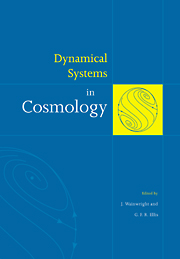Book contents
- Frontmatter
- Contents
- List of contributors
- Preface
- Introduction
- Part one Background
- Part two Spatially homogeneous cosmologies
- 5 Qualitative analysis of Bianchi cosmologies
- 6 Bianchi cosmologies: non–tilted class A models
- 7 Bianchi cosmologies: non–tilted class B models
- 8 Bianchi cosmologies: extending the scope
- 9 Exact Bianchi cosmologies and state space
- 10 Hamiltonian cosmology
- 11 Deterministic chaos and Bianchi cosmologies
- Part three Inhomogeneous cosmologies
- Part four Conclusion
- References
- Subject index
5 - Qualitative analysis of Bianchi cosmologies
Published online by Cambridge University Press: 10 November 2009
- Frontmatter
- Contents
- List of contributors
- Preface
- Introduction
- Part one Background
- Part two Spatially homogeneous cosmologies
- 5 Qualitative analysis of Bianchi cosmologies
- 6 Bianchi cosmologies: non–tilted class A models
- 7 Bianchi cosmologies: non–tilted class B models
- 8 Bianchi cosmologies: extending the scope
- 9 Exact Bianchi cosmologies and state space
- 10 Hamiltonian cosmology
- 11 Deterministic chaos and Bianchi cosmologies
- Part three Inhomogeneous cosmologies
- Part four Conclusion
- References
- Subject index
Summary
In Section 5.1 we give an overview of the use of qualitative methods in analyzing Bianchi cosmologies, expanding on the brief remarks in the Introduction to the book. Section 5.2 provides an introduction to the use of expansion–normalized variables in conjunction with the orthonormal frame formalism, thereby laying the foundation for the detailed analysis of the Bianchi models with non–tilted perfect fluid source in Chapters 6 and 7. In Section 5.3 we discuss, from a general perspective, the use of dynamical systems methods in analyzing the evolution of Bianchi cosmologies, referring to the background material in Chapter 4.
Overview
As explained in Section 1.4.2 there are two main approaches to formulating the field equations for Bianchi cosmologies:
the metric approach,
the orthonormal frame approach.
In the metric approach the basic variables are the metric components gαβ(t) relative to a group–invariant, time–independent frame (see (1.89)). This approach was initiated by Taub (1951) in a major paper. After a number of years researchers became aware that the Bianchi models admitted additional structure, namely the automorphism group, which plays an important role in identifying the physically significant variables (also referred to as gauge–invariant variables, or the true degrees of freedom). This group is defined to be the set of time–dependent linear transformations (1.87) of the spatial frame vectors that preserve the structure equations (1.88).
- Type
- Chapter
- Information
- Dynamical Systems in Cosmology , pp. 107 - 122Publisher: Cambridge University PressPrint publication year: 1997
- 3
- Cited by

